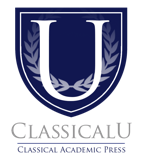This course is taught by a vibrant professor of philosophy, Dr. David Schenk, who introduces teachers to some of the essential elements of philosophy. Philosophy has traditionally been a capstone study (along with theology) for a classical education that follows the study of the liberal arts. Every classical educator, therefore, should have at least modest philosophical training. This course provides that by presenting us with some of the most central ideas, debates, challenges, arguments in the history of philosophy. The course begins with a call to using clear language to express clear ideas, then proceeds to a critique of modern relativism and skepticism about truth. Then Dr. Schenk proceeds to discuss ontology (the study of being), Anselm’s famous ontological argument for the existence of God as well as his cosmological argument for the existence of God. The course turns to examine the problem and the solution to the problem of evil as well as a presentation of the design arguments for the existence of God (including the fine-tuning argument) and concludes with presentations about causation and the free will debate. Teachers taking this course will also enjoy hearing Dr. Schenk’s insights and passion for education in the recorded conversations with Dr. Christopher Perrin.
Dr. David Schenk served as a professor of philosophy at Messiah College since 2006, where he taught courses in logic and philosophy. Known for his clarity of thought and quick wit, David is passionate about helping students to learn the art of clear and cogent thinking. He is also an advocate for the renewal of classical, liberal arts education and has attended classical conferences hosted by the Society for Classical Learning and the Alcuin Fellowship.

To learn more about earning a certificate for this course, please visit “How do I Obtain a Course Certificate?” on our FAQ page. Our course certificates are valued by classical schools and co-ops worldwide, and you can also be on your way to obtaining an elective credit toward a Level 2 certificate with your completion of this course. Teachers certified with either ACSI or ACCS will see continuing education unit (CEU) credits listed on our course certificate for you to submit to either organization (with more information on certification credit here).




